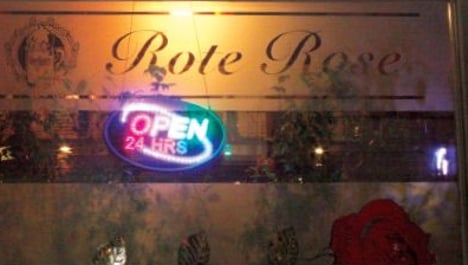Bei Schlawinchen
Schönleinstr. 34, Kreuzberg, U-Bhf Schönleinstr.
Hidden away in the rapidly gentrifying Graefekiez, the iconic 24-hour dive bar Bei Schlawinchen is a place where tweaked out Asoziale and hardened day-drinkers rub shoulders with post-party ravers, lapsed anarchists, football fanatics and would-be artists. Looming above the bar is a veritable freak show of antiquarian kitsch – shop window mannequins, a rocking horse, a gramophone, model ships, a creepy painting of two babies drinking pints of beer and even a motorcycle. Schlawinchen opened on July 7 1979, meaning it’s been serving up glass mugs of cheap Kindl continuously for about 365 months, almost without rest (it closed once for three months). But if you want to catch some of the all-hours madness, hurry: the 24/7 concept may well be in its dying moments, as the Ordnungsamt is determined to once again combat noise in the area.
Rote Rose
Adalbertstr. 90, Kreuzberg, U-Bhf Kottbusser Tor
Just off Kotti on Adalbertstraße, Rote Rose might be Schlawinchen’s even trashier little sister. The pub is housed in a former brothel, a past that informs the name and decor. The only items on the menu are Kindl (€2.20 for a 33cl, €2.70 for a 50cl), wheat beer, schnapps, wine, a few long drinks and coffee. The smoke-filled Raucherkneipe is inhabited by slot-machine-playing regulars, who make up an extremely diverse group, from professors to Pfandpiraten, but largely seem to have one thing in common: advanced-stage alcoholism. At night, the bar is also popular with hip tourists looking for the essence of Alt-Berlin, leading to varying degrees of confrontation. The current owners say Rote Rose has been open “since the fall of the Wall, maybe a little earlier”, but during the reign of former owner Ali, it was frequently shut down by the tax office, making any calculation of days difficult.
Ohne Ende
Dieffenbachstr. 36, Kreuzberg, U-Bhf Schönleinstr.
Only a couple blocks from Schlawinchen, Ohne Ende has actually only been open continuously since the last change of management in December 2009. The dark bodega-style interior is adorned with classic film posters and oddities like a large doll motorcycle. Make sure to try a Czech Bruno beer, a rarity in Berlin, or one of Ohne Ende’s strong original cocktails like the Superman (a vodka-juice mix). Darts, billiards and foosball are popular with the crowd, which runs the gamut age-wise and consists of the prerequisite drunkards, as well as assorted locals and students from several nearby language schools. Ohne Ende’s biggest selling point? Tuesday happy hour: between 4 and 10pm, all beers are only €1.
Musikcafe Beauty
Hohenstaufenstr. 33, Schöneberg, U-Bhf Viktoria-Luise-Platz
Musikcafé Beauty, the one and lonely Kneipe in this quiet corner of Schöneberg, is on the tamer end of the 24-hour bar spectrum. It’s a tranquil little world that expats hardly ever see, where middle-aged German regulars – from lawyers to Hartzers – grab an after-work beer and an evening game of darts. Operational since January 1978, it has only closed once a year at most, meaning it’s near-constantly been open for some 396 months. An official “Hertha BSC Fantreff” – replete with a framed Marko Pantelic jersey on the wall – the Beauty is big on football culture. The drink of choice is a big 40cl Kindl, only €2.20. Also pleasantly affordable: a 50cl Paulaner wheat beer for €2.80 or a Sex on the Beach for €3.90. Beauty also has its very own Frauenquote: On Saturday, there’s unlimited free sekt all night for the ladies! Just don’t be stupid and try to order food: Das hier is’ ‘ne Raucherkneipe, Schätzchen!



 Please whitelist us to continue reading.
Please whitelist us to continue reading.
Member comments